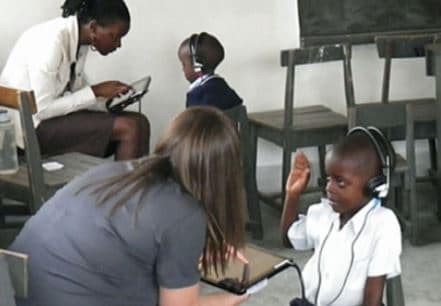Editor’s Note: Today’s news post comes from Canadian journalist Michelle Leslie who discusses some innovative solutions to address global hearing loss.
Google.org, the charitable arm of the world’s largest search engine, is supporting World Wide Hearing (WWH) to find a solution to what the World Health Organization (WHO) has described as one of the largest disabilities on the planet.
Hearing loss.
It affects one-third of people over the age of 65 and more than 1 billion young people are at risk for impaired hearing.
The WHO highlighted the risk of hearing loss in a release in early 2015 stating that half of young people, between the ages of 12-35 “are exposed to unsafe levels of sound.”
Through Google Impact Challenge: Disabilities, World Wide Hearing in Montreal, was awarded a grant to do something never done before. Develop and map out data points on hearing health from across the world in the hopes of better understanding hearing loss.
10,000 people will have their hearing tested as researchers try to better understand the dynamics of hearing loss.
This global database will be the first step in understanding and addressing the dynamics of this potentially debilitating disability.

Audra Renyi, WWH Executive Director
WWH Executive Director Audra Renyi grew up experiencing the first hand impacts of hearing loss. Her father suffered hearing loss as a child when he contracted an ear infection in his native Romania.
“So many people live with this disability that often goes under the radar,” says Renyi.
Compounding the fact is that new research has shown a direct link between hearing health and mental health. How well you hear is directly linked to your risk for dementia, depression and anxiety.
Researchers have found that cognitive decline increases by up to 40% as hearing slides. With young people, hearing loss can have serious impacts on development.
Children and young people who suffer from hearing loss are at a greater risk for depression and anxiety; they also face challenges in school, lower self-esteem and social isolation. How well you hear is connected to how you feel and for young people, how well they develop; making early diagnosis and treatment vital.
The first step for the team is to test thousands of ears all over the world and map out the world’s hearing health.
To make this possible, WWH needed a technology partner who could help make this a reality. They partnered with Clearwater Clinical, a Canadian company and creators of the first clinically validated iPad audiometer.
“No other hearing testing equipment is as compact, easy-to-use, and fun,” says Dr. Matthew Bromwich, Otolaryngologist and Co-founder of the company
It’s called SHOEBOX Audiometry and it’s comprised of software that is loaded onto an iPad and shipped with calibrated headphones. The solution is an audiometer that can administer diagnostic hearing tests. The test is designed to feel more like a computer game, and the data it produces is transmitted and stored safely and securely onto the cloud.
Mobile medicine, like the kind delivered through SHOEBOX is an important step in being able to reach communities. The simplicity of the technology allows for quick and easy deployment to parts of the world where people may have never had their hearing tested.
But not all apps are created equal. A quick Google search will pull up lots of tablet and phone applications on hearing testing, many of which can provide good, general screening results. However, only a handful of apps like SHOEBOX, Frye Colt, Piccolo and iAudiometer provide a full medical diagnostic and essentially remotely replicate a traditional audiology booth.
For Renyi the new approach made sense.
“We wanted to find mobile solutions and solutions that we had confidence in. There is solid research behind it and we have a lot of confidence in the data,”says Renyi.
Another important factor is that while the data must be interpreted by an audiologist, the hearing tests can be performed by individuals that aren’t hearing health professionals.
This novel approach is already being well received. In Guatemala, technicians have been trained and have administered tests in several communities.
The simplicity of the technology means that with some hands-on training, individuals – including many women – are being empowered with the opportunity to help perform vital health services, and in turn, support their families.
The global hearing project is performing hearing screenings in the Mohawk community south of Montreal this month with plans for testing in South America and Southeast Asia later this year.
Michelle Leslie has worked as a journalist for over 10 years, in both traditional media as a television reporter, anchor and host and in the digital world as a reporter. With a dual background in science and journalism, she focuses on evidence based reporting, primarily in the fields of climate, energy and the environment. Her reporting interests also include focusing on innovations in the health sciences sector. Her work has been featured by The Boston Globe, The Globe and Mail, CBC and Thomson Reuters to name a few. A fellow from the Munk School of Global Affairs, Michelle currently resides in Ottawa with her young son.
*title image courtesy cbc.ca







